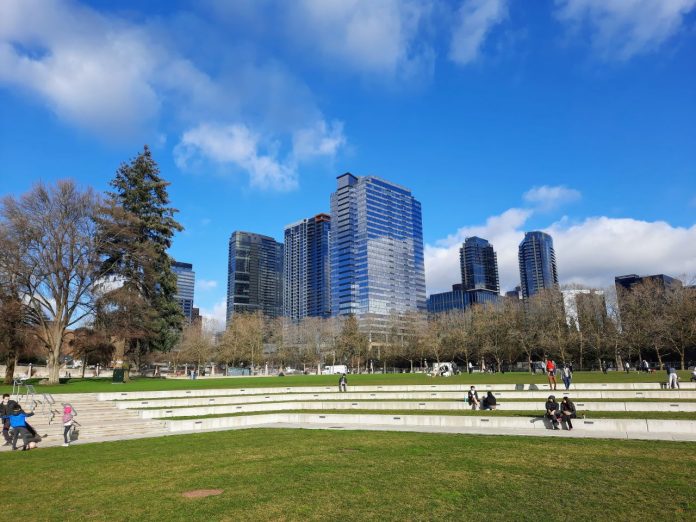
2024 is a critical year for the City of Seattle. It’s a comprehensive plan year. It’s the year we’ll shape and pass a new transportation levy. It’s the year we’ll negotiate a new police contract, and it may — just may — be the year we finally solve our structural budget deficit by finally implementing major new streams of progressive revenue. All we need is a City Council that’s taking our linked challenges seriously.
The good news is that the August Primary went really, really well for Urbanist-endorsed candidates: six of seven candidates we endorsed for Seattle City Council made it through the top-two primary (all but one were the leading vote-getters), and all but one of our candidates made it through their primaries in Bellevue City Council, King County Council, and Port of Seattle races as well.
The bad news is that those strong results were achieved before one-percenter, regressive cash began flooding into these races to try to tilt them toward more conservative candidates. We’re close to the Council we need. It’s up to urbanists to turn out.
For who? We’ve got you covered. The Urbanist Elections Committee directly interviewed more than 30 candidates running for local office to find the cream of the crop (and to weed out candidates not yet ready for prime time). We are excited to present to you an Urbanist slate of candidates that includes stellar leaders, change-makers, and visionaries with real policy know-how and passion. Let’s get them elected and get to work.
The Urbanist’s 2023 General Slate Cheat Sheet
- City of Seattle Proposition No. 1: Vote Yes
- King County Council, District 2 – Girmay Zahilay
- King County Council, District 4 – Jorge Barón
- King County Council, District 6 – Claudia Balducci
- King County Council, District 8 – Teresa Mosqueda
- Port of Seattle Seat 2 – Sam Cho
- Port of Seattle Seat 5 – Fred Felleman
- Seattle City Council District 1 – Maren Costa
- Seattle City Council District 2 – Tammy Morales
- Seattle City Council District 3 – Alex Hudson
- Seattle City Council District 4 – Ron Davis
- Seattle City Council District 5 – ChrisTiana ObeySumner
- Seattle City Council District 6 – Dan Strauss
- Seattle City Council District 7 – Andrew Lewis
- Bellevue City Council, Position 3 – Mo Malakoutian
- Bellevue City Council, Position 5 – Janice Zahn
Vote Yes on Seattle Proposition 1: The Housing Levy
We don’t need to tell you (but we will) that Seattle is in the middle of a housing crisis. That’s a complicated problem, and there’s no one policy change that’ll turn the tide by itself, but it’s incredibly clear that investing in the development of reliably affordable housing by renewing the Seattle Housing Levy is a major part of stemming the rising tide of high costs.
In nominal terms, this renewal would more than triple the size of the last levy, raising $970 million over nine years. That’s a lot of money, but with the significant inflation in financing and construction costs that’s taken place since the last levy, it isn’t quite the increase in housing production it seems like on paper. Still, proponents promise that the levy would create at least 3,000 new affordable homes — and those homes are sorely needed.
The case against the levy is pretty flimsy. Critics can complain that housing is too expensive to build in Seattle — and it is — but starving nonprofit homebuilders of resources is not going to help. Market-rate developers have a big role to play to solve our housing shortage, but they are not going to build homes that are affordable for very low-income folks. Government has to step in to fill the void, and the levy is how it raises money to do that.
Seattle should certainly try to drive down the cost of homebuilding to get more out of the levy and tackle the housing crisis. That means streamlining permitting, getting rid of onerous design standards, and enacting citywide zoning reform so all the affordable apartments are not jammed into tiny urban villages on a fraction of available land that drives up land costs as everyone competes for scarce sites.
We support all of that. And the reality is, cities also need to invest in order to expand their affordable housing stock. The housing levy is a golden opportunity to do just that. Vote yes.
Seattle City Council, District 1 – Maren Costa
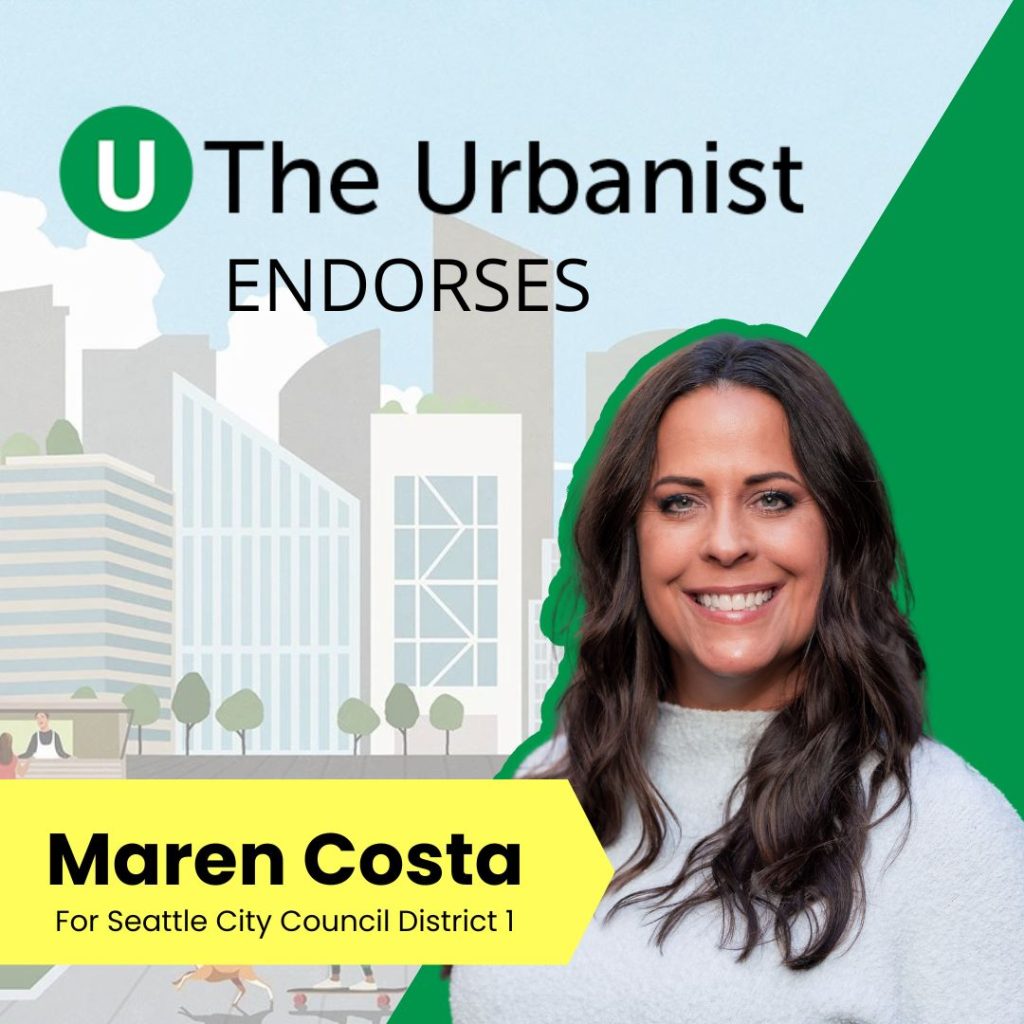
Running with a strong focus on climate justice and workers’ rights, Maren Costa emerged out of a tough primary as the clear choice for urbanists in this race. A former tech worker with solid organizing experience (she was fired from Amazon for trying to start a union, which we think is badass), Costa impressed us with her understanding of how land use, building codes, and transportation policy impact our region’s greenhouse gas emissions. She is the only candidate in this race to explicitly support housing abundance via the Alternative 6 growth option for Seattle’s Comprehensive Plan update, and it was clear from her interview that she understands the urgency of the housing crisis that our region is facing.
By Costa’s own admission, she is occasionally light on specifics when it comes to specific transportation projects or sources of progressive revenue. This is not uncommon with first-time candidates, and we think her values and clear support for equitable climate policy, labor rights, and public transportation provide her with a solid framework through which to evaluate the decisions she’ll face on council. On the complex issue of homelessness, she expressed a nuanced perspective underpinned by the conviction (which we share) that sweeps are fundamentally counterproductive towards the goal of getting people housed.
She advances alongside Rob Saka, a business-backed candidate whose lack of coherent policy thinking underwhelmed us. His former opponents take the same view: all six former candidates in District 1 have since endorsed Costa. Saka does not come close to matching Costa’s qualifications or vision, which is perhaps why Costa advanced out of her primary with such a strong showing. As her former opponents have noted, Seattle would benefit from a climate-focused leader who understands just how every issue of urbanist import is related to this defining challenge of our time. Vote Costa.
Questionnaires in D1:
Seattle City Council, District 2 – Tammy Morales
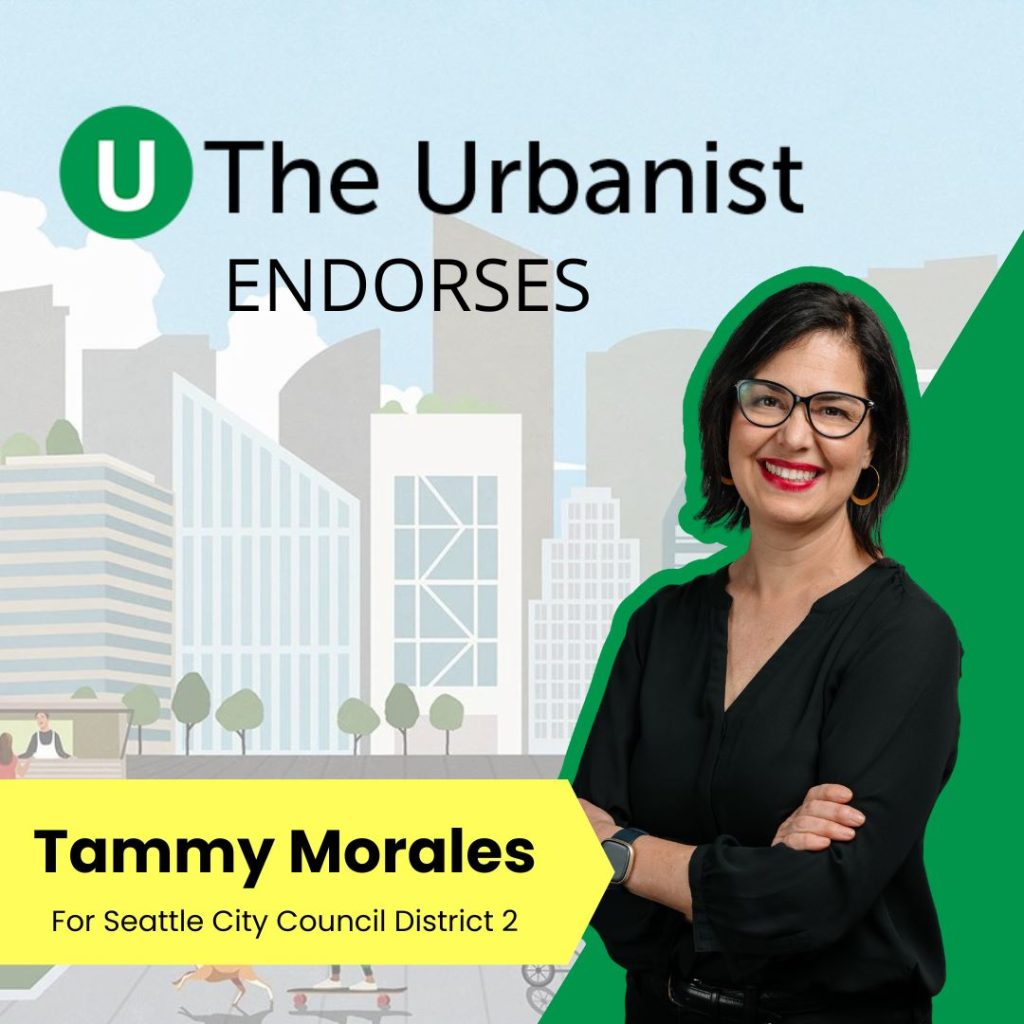
Four years ago, we endorsed Tammy Morales because of her clear support for investments in transit and affordable housing, commitment to our most vulnerable community members, and progressive vision. We have not been disappointed. Morales has proven herself to be an outstanding councilmember for urbanists. She has been a champion for safe streets and pedestrian safety, was an early supporter of social housing, and laid out her support for Comprehensive Plan Alternative 6 in an op-ed in the Seattle Times.
Her competition, Tanya Woo, is a small business owner and CID nightwatch organizer who recently organized a protest against a planned shelter expansion adjacent to the Chinatown-International District (CID). In her interview, Woo’s policy positions were either unclear or unpalatable to us — for example, she indicated that she would have voted to support Seattle’s bill criminalizing drug possession, but also that she does not think carceral approaches are an effective approach to substance abuse. On many of the issues that are most important to us, we do not know with certainty where Woo stands.
Even if Woo wasn’t such a disappointing opponent, we’d stand with Morales thanks to her track record of results. We don’t agree with her on every issue — most visibly, the siting decision around the CID Sound Transit station — but we’ve nonetheless been impressed time and time again with her combination of vision, moral clarity, and ability to translate both into policy wins on the ground. Social housing wouldn’t be heading towards implementation without Morales. Safe streets wouldn’t be progressing to the degree they are in South Seattle. And the comprehensive plan would be in far worse hands.
In sum, we think the choice in this race is clear: vote Morales. Morales has shown us exactly how her progressive values translate into action, and we would be lucky to have four more years. She more than deserves re-election.
Questionnaires in D2:
Seattle City Council, District 3 – Alex Hudson

Compared to some other district races we could name (but won’t, because we’re trying to be polite), Seattle’s District 3 race drew an extremely strong field of contenders to replace lefty firebrand Kshama Sawant. But for us, it wasn’t hard to choose among them by picking the person across all the city council races we believe is clearly most likely to be able to deliver on progressive urbanist policies from day one: Alex Hudson.
We’ve been fans of Hudson since her days pushing the agenda of one of the city’s best and yet often overlooked neighborhoods at the First Hill Improvement Association, gathering a coalition of transportation and housing advocates together to push the developer of the Washington State Convention Center expansion to provide $83 million in public benefits for the substantial amount of public space they were set to gain. When you look at the new protected bike lane buffers along 8th Avenue or Pike and Pine Streets or Freeway Park improvements that are on the way, they are the result of Hudson’s efforts. Many of the affordable housing projects in First Hill bear her fingerprints as well.
Hudson took the reins as executive director at Transportation Choices Coalition in 2018 and continued to be in the thick of transportation policy debates. From being front-and-center in the negotiations around the last statewide transportation package, which delivered free transit for kids on every transit agency in the entire state, to the push to reform Sound Transit’s punitive fare-enforcement regime, Hudson has shown she can deliver.
After four years of Alex Pedersen as transportation committee chair, we need someone who can come in and reverse the damage. Hudson has been an outspoken critic of recent decisions by the Sound Transit board to study options that deviate wildly from what the voters approved in 2016 with ST3, and we can’t think of anyone running in the citywide field who would be a better replacement for Debora Juarez on the Sound Transit board. Given her breadth of experience, it may be hard for King County Executive Dow Constantine to deny her this posting — although there are no guarantees.
In some ways, Hudson’s opponent, Central District-raised Joy Hollingsworth, is not the typical centrist candidate. For starters, she helps run her family’s cannabis farm. Unlike Woo and Saka, Hollingsworth did not show up at City Hall to demand the city reignite the drug war. She often talks about senior housing, aging in place, and the need for more housing. However, she also has a history of opposing housing projects, including a modest five-story apartment proposal on Madison Street near a set of properties owned by her family. While Hollingsworth worried about her family’s view of Bellevue, many D3 residents worried about keeping a roof over their head and not being priced out of Seattle.
We know Hudson would lead on transportation and not shy away from challenging the status quo. We know she’d fight to add more housing in every neighborhood and make sure it actually gets built. We can’t say the same of Hollingsworth. Vote Hudson.
Questionnaires in D3:
Seattle City Council, District 4 – Ron Davis

Ron Davis is the clear urbanist choice in D4. More than just about any else this cycle, we know what Davis is intending to do if voters send him to city hall and it’s music to our ears. Davis clearly has policy chops: we loved hearing him explain the importance of single-stair mid-rise apartments to unlocking livable, affordable, family-sized housing across the city, as he did at a recent forum we co-hosted with the Complete Communities Coalition. Davis isn’t shy about pursuing big progressive policy wins even in the face of powerful opposition, and that is an attitude that is sorely needed on council.
Davis believes in a more walkable, bikeable, transit-rich, and just Seattle with a home for everyone. He will vote to raise progressive revenue to fund affordable housing and social infrastructure that can actually grapple with the scale of the homelessness crisis. He will vote to allow more housing across the city as evidenced by his op-ed in this very periodical arguing for a bolder Alternative 6 to the Seattle Comprehensive Plan. He will vote to dedicate more resources to sidewalks, transit, and bike facilities, and we do not expect him to hide behind process and budget austerity like so many councilmembers have in the past.
This is far more than we can say about his opponent, who has hidden key policy views and failed to articulate visionary plans to meet mobility and housing needs. We shouldn’t be too eager to hear from her, though. Where Maritza Rivera has made her policy views clear, it’s been bad news, such as her opposition to abolishing single-family zoning and her belief in deferring to homeowner-dominated groups when it comes to approving housing density.
Seattle needs progressive urbanist leadership of the kind Davis can deliver. Vote Davis.
Questionnaires in D4:
Seattle City Council, District 5 – ChrisTiana ObeySumner
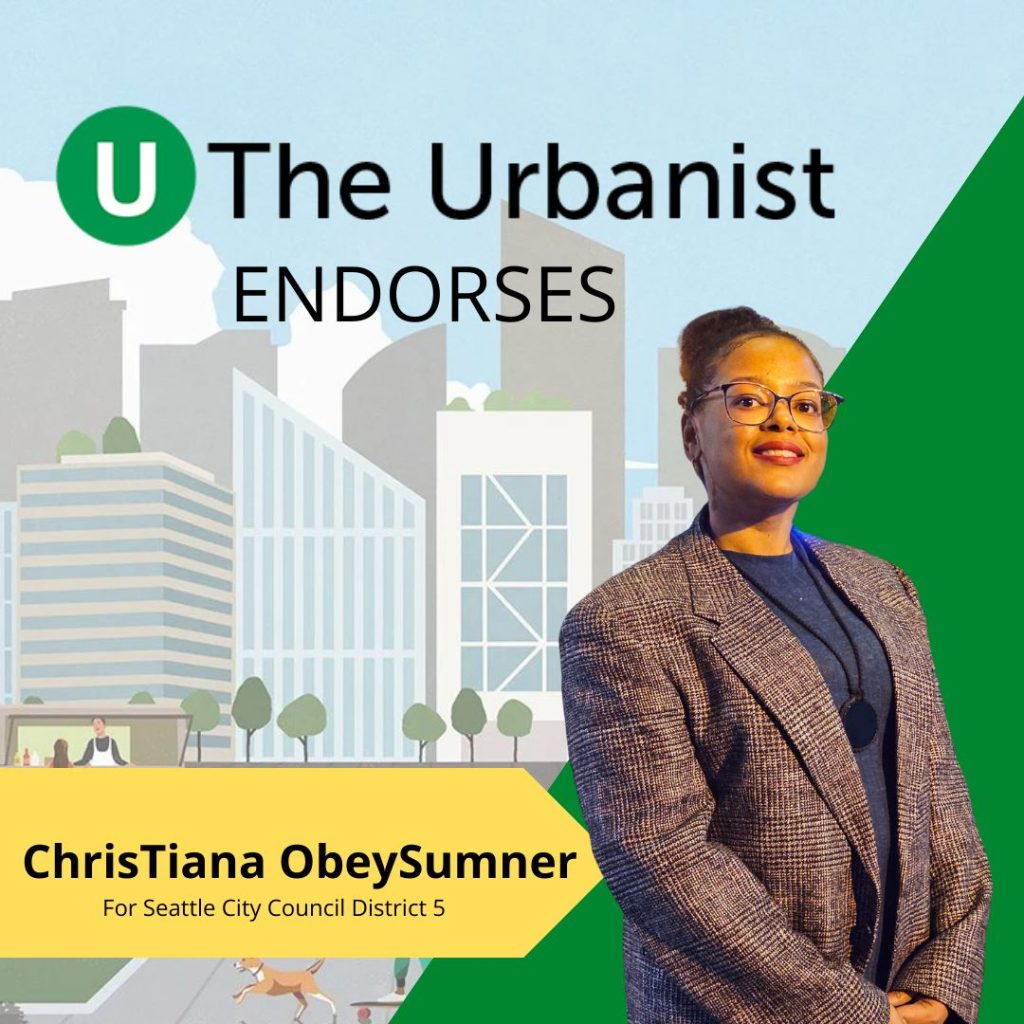
Our choice in the primary election for this race, Nilu Jenks, did not earn enough votes to move forward to the general election despite an impressively strong result for a candidate not endorsed by The Stranger or The Seattle Times (The Urbanist effect?!). Of the two candidates who made it to the general, we prefer Christiana ObeySumner.
ObeySumner’s core values align with ours. They support Alternative 6 for the Comprehensive Plan, believe in prioritizing investing in affordable housing programs and incentivizing developers to create more affordable housing projects, and support expanding the Housing Levy. They support safe pedestrian-friendly streets; oppose encampment sweeps; and understand that public safety is created through addressing root causes, not through criminalization. As a person with a disability, they’ve seen firsthand where our sidewalks and transit fails and they’ve led on seeking improvements.
We do have concerns about ObeySumner’s ability to turn these values into tangible results. We found ObeySumner difficult to nail down on specific actions they would take in office to accomplish our shared goals. Too often they reverted to lofty consultant-speak when we were looking for concrete, actionable plans. That said — as we’ve mentioned in other writeups — these are not unusual qualities in first-time candidates and we expect them to learn more about the specifics when they’re on the job.
For what it’s worth, we believe that Moore — who has signaled a commitment to Alternative 5 in the comprehensive plan, to expanded transit and density across the city, and to pursuing specific progressive revenue sources — would still be an improvement over sitting councilmember Debora Juarez if elected. We welcome her thoughtful approaches to a number of urbanist issues.
Vote ObeySumner.
Questionnaires in D5:
Seattle City Council, District 6 – Dan Strauss
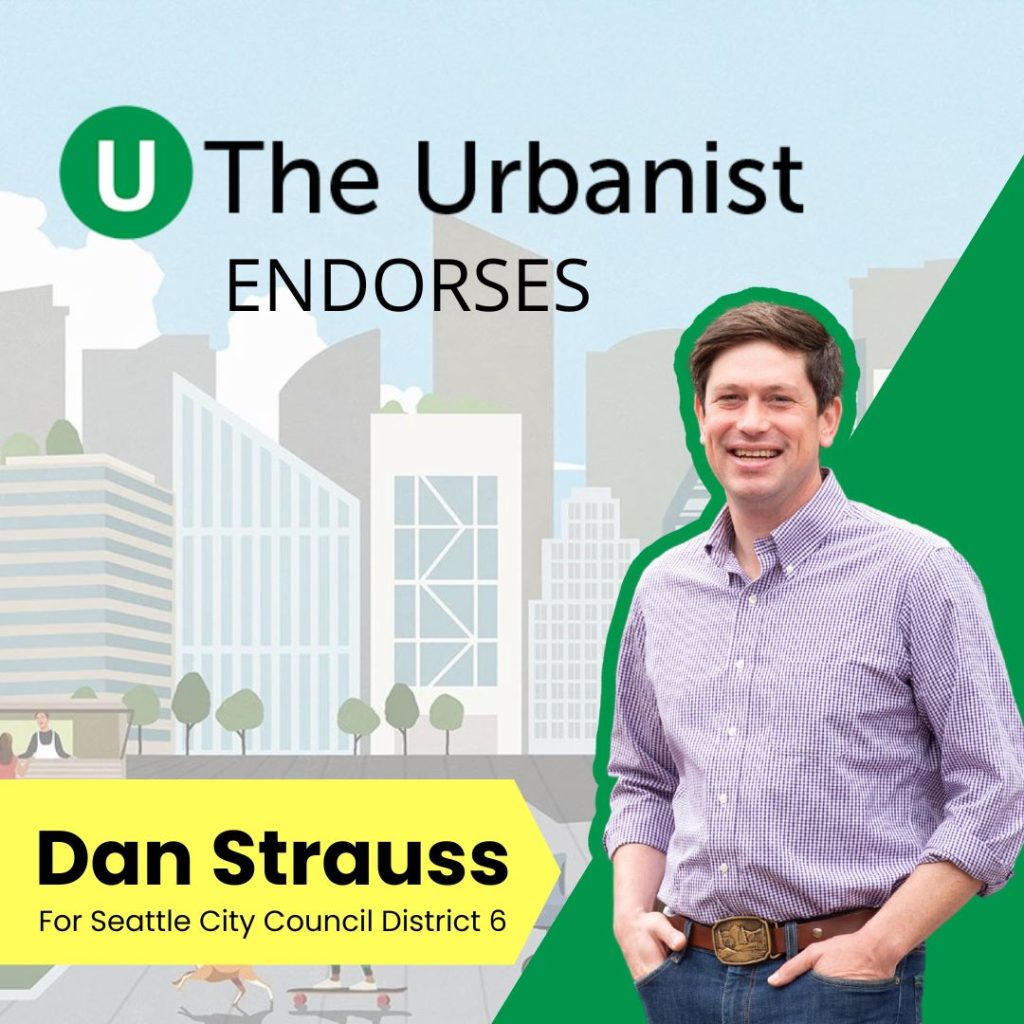
Four years ago, this committee declined to endorse in the primary in District 6 because we were unimpressed with the state of the field. Four years later, our position hasn’t really changed; there are no truly strong urbanists in this race. However, Dan Strauss is clearly the better candidate in this race and his re-election is one Urbanist readers should support.
Strauss has, for the most part, spent his time on council laser-focused on issues of interest to his constituents in Ballard, occasionally to the detriment of a broader vision for the city. For example, he’s worked to close the “Missing Link” of the Burke-Gilman Trail via a Leary Way alternative, but shown less urgency for safety projects outside his district.
We’re hoping for more from the land use committee chair; the City Council sorely needs a strong leader in this role as it works to pass a “Major Update” to its Comprehensive Plan by the end of 2024. While we appreciate Strauss’s dedication to traffic safety and liberalizing street cafe rules, the few changes he has worked to implement have been relatively minor.
The elections committee also vehemently disagreed with Strauss’s vote in favor of giving Republican City Attorney Ann Davison the power to prosecute drug possession, for which he gave no coherent explanation. To us, urbanism cannot mean ‘streateries for the rich and jail for the poor,’ and Strauss’s work to ‘resolve’ encampments in Ballard, while to some degree an improvement over the status quo, is still far too focused on making the people involved go away rather than ensuring that they truly have stable housing to move to.
District 6 deserves a champion for a truly expansive and ambitious vision of urbanism. While that is not an option this year, the choice of how to vote here is clear: Pete Hanning is a clear downgrade and all urbanists should vote for Strauss. He thankfully came through the primary with a strong showing — nearly 52% of the vote. District 6 readers: vote Strauss, and perhaps also encourage him to show a more expansive vision in his next term.
Questionnaires in D6:
- Dan Strauss
- Pete Hanning did not return a questionnaire.
Seattle City Council, District 7 – Andrew Lewis
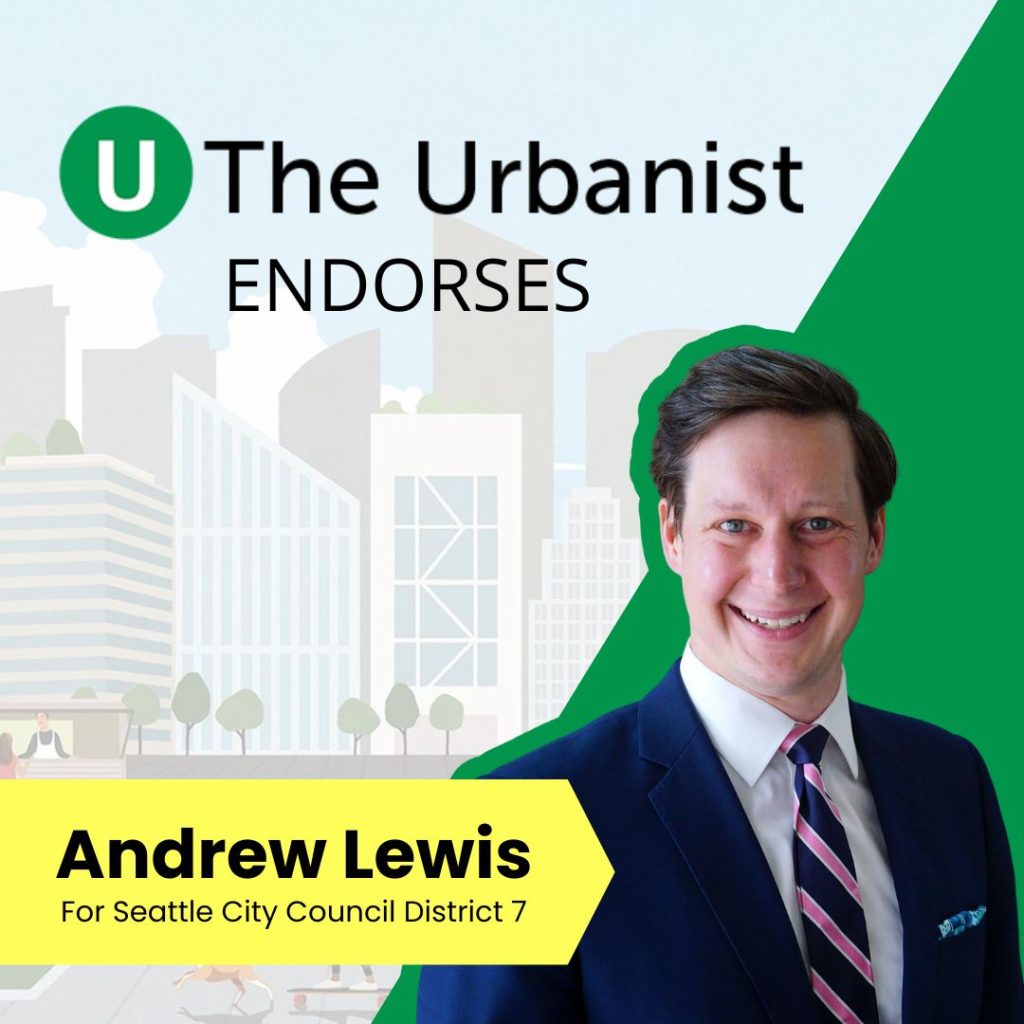
Four years ago, Dan Strauss and Andrew Lewis seemed like pretty much the same candidate: young white dudes with labor backing and floppy haircuts. Four years later, some differences have emerged, and Lewis has impressed us with some strong stands and votes. In a year in which we’re electing the Council that’ll adopt the 2024 comprehensive plan, his generally urbanist vision, open communication with our allies, and willingness to take tough votes will be crucial to our ability to upzone the city, pedestrianize plazas, support social housing, build bike infrastructure, and generally deliver on our goals.
Lewis’s willingness to listen and reconsider his stances is a gift — and it can be a curse. He was one of two incumbents up for reelection that voted against giving our extremely punitive City Attorney Ann Davison the power to reignite the drug war and prosecute possession. We respected Lewis for doing the right thing despite pressure from powerful establishment figures to do otherwise. Unfortunately, a few months later he did ultimately vote to authorize a very similar bill after facing blowback. On a more positive note, he has also changed his mind in response to the community by voting to amend legislation aimed at protecting renters from late fees. And he didn’t vote to undo that one.
Lewis faces no serious competition for the progressive mantle or urbanist support. His opponent Bob Kettle emerged from the bowels of the Queen Anne Community Council, which has been a hotbed of housing appeals and opposition. In that role, Kettle has taken an evidence-free approach to public safety and ignored community input from outside that particular wealthy homeowner cabal. He would be a step backwards.
While some might be upset at Lewis for his flip-flop on drug possession, Kettle would have no qualms about a drug war and go all in a punitive, carceral approach. We have no faith Kettle would pursue the civilian crisis responder program that Lewis is doggedly fighting to push the Harrell administration to implement despite obstruction and footdragging from the Seattle Police Department and the Seattle Police Officers Guild. Kettle would vote against zoning changes the city needs to address its housing crisis, and he would be an irresponsible steward of the JumpStart dollars Lewis has supported. Vote Lewis.
Questionnaires in D7:
- Andrew Lewis
- Bob Kettle did not return a questionnaire.
Bellevue City Council, Position 3 – Mo Malakoutian
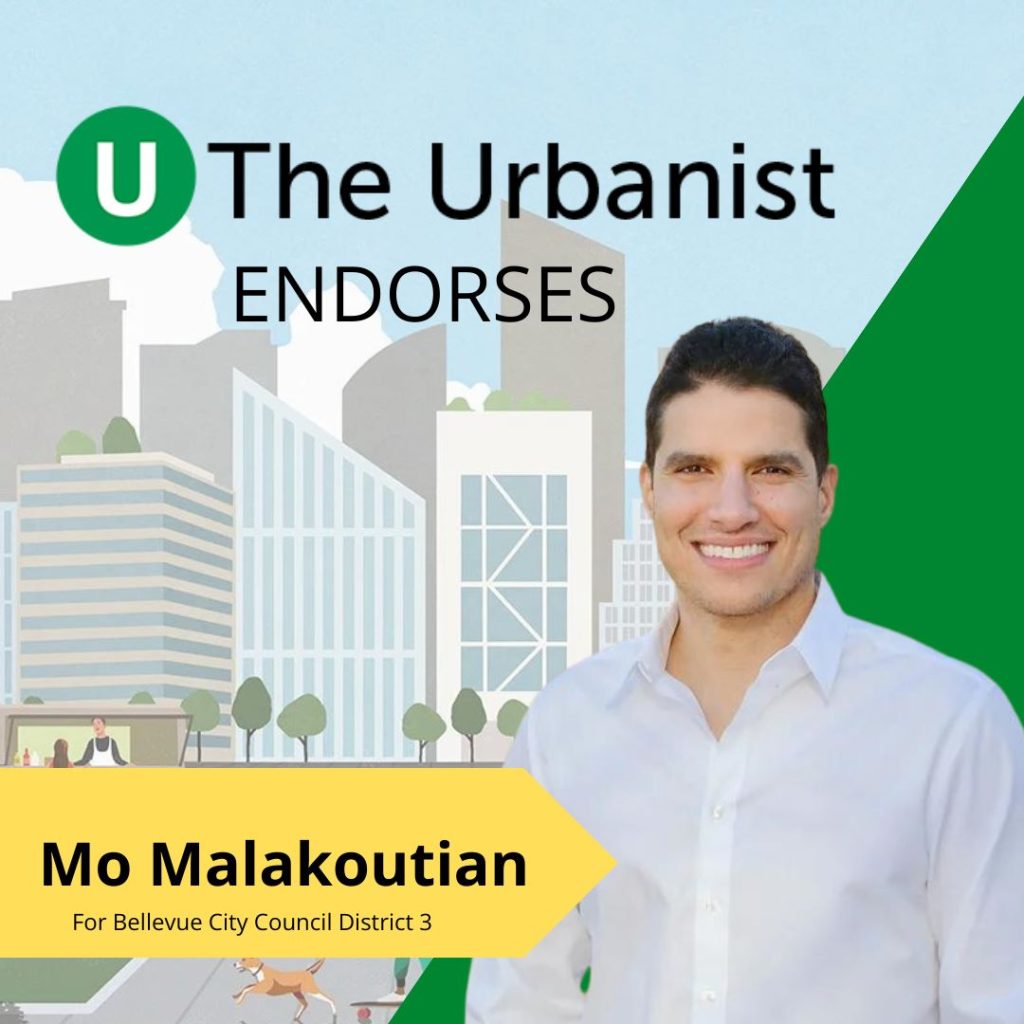
As one of the most progressive officials to ever serve on Bellevue City Council, the departure of Councilmember Jeremy Barksdale after one term certainly leaves big shoes to fill on the Eastside. The Urbanist believes that, with his staunch support of missing middle housing in every Bellevue neighborhood and his history of service, Planning Commissioner Mo Malakoutian will be up to the task.
An affiliate professor of civil engineering at UW, Malakoutian displayed a solid understanding of how a lack of affordable housing in Bellevue contributes to traffic and increased pollution on our highways. On the recently-passed King County Crisis Cares levy, he expressed strong support for siting an Eastside facility in Bellevue despite the opposition sure to come from anti-homeless advocates, who delayed Bellevue’s first shelter for homeless men for more than a decade. And he expressed a commitment to investing more into a safe multimodal network that will actually help get Bellevue residents out of their cars.
From our interview, Malakoutian also appears to have an informed read of the city’s political dynamics and what arguments conservative interests have used to block progress. He may lack polish when it comes to the messaging he uses around the policies he supports, but with an easy path to victory as the only serious candidate in the race, Malakoutian has ample time to work on this issue. In him, Bellevue residents will have a strong supporter of environmental action, affordable housing, and sustainable transportation, and we believe Malakoutian has earned their vote.
Questionnaire in D5:
- Mo Malakoutian
- Alex Tsimerman did not respond.
Bellevue City Council, Position 5 – Janice Zahn
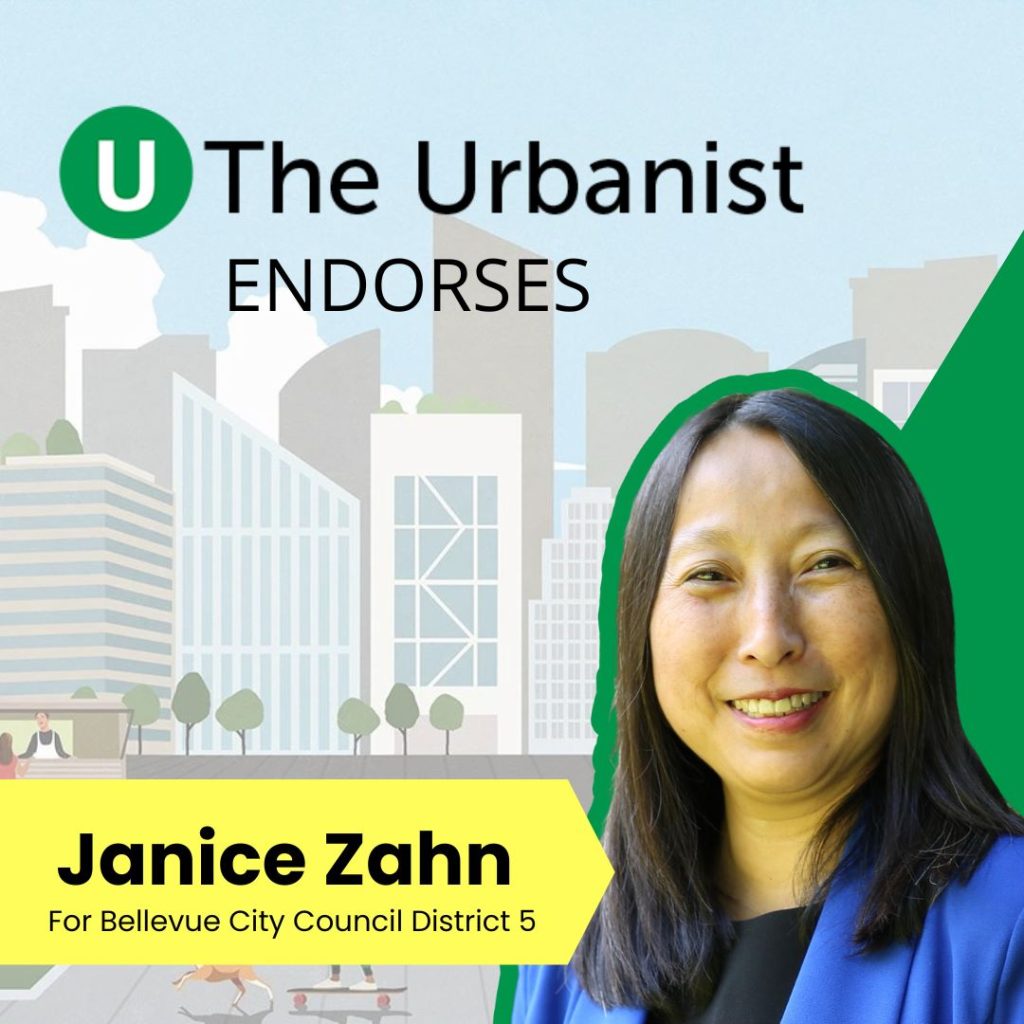
If you are a Bellevue voter who cares about housing affordability, multimodal transportation, and climate change action, then Councilmember Janice Zahn is your champion. In her six years on Bellevue City Council, Zahn has consistently shown an urgency in addressing these intersecting issues in ways that few of her colleagues have mirrored. Whether repeatedly advocating for more dedicated funding for deeply-affordable housing, backing up her support for Vision Zero with action, or holding the city accountable towards meeting its climate targets, Zahn has both the experience and vision to help Bellevue become the equitable city that it says it wants to be.
Her background as a Chief Engineer for the Port of Seattle likely contributes to her deliberate style, which leads her to seek to comprehensively understand issues at hand. We don’t always agree with her votes, such as her vote to fund a seven-member transit police unit within the Bellevue Police Department, but Zahn’s insistence that she will listen to the voices of tenants show that a set of progressive values underpins her thought process as she intentionally weighs issues. We think her deliberate approach to governance is something that people of all political persuasions can appreciate, and we hope she will continue to lead with progressive values like she has during her six years in office.
Regardless of her opposition, Zahn has earned another four years on Council. We have confidence that she will use that time to continue advancing policies that help create a Bellevue that is more affordable, sustainable, and equitable. Vote Zahn.
Questionnaires for Position 5:
- Janice Zahn
- Betsi Hummer did not respond. Read about her views here.
King County Council, District 2 – Girmay Zahilay
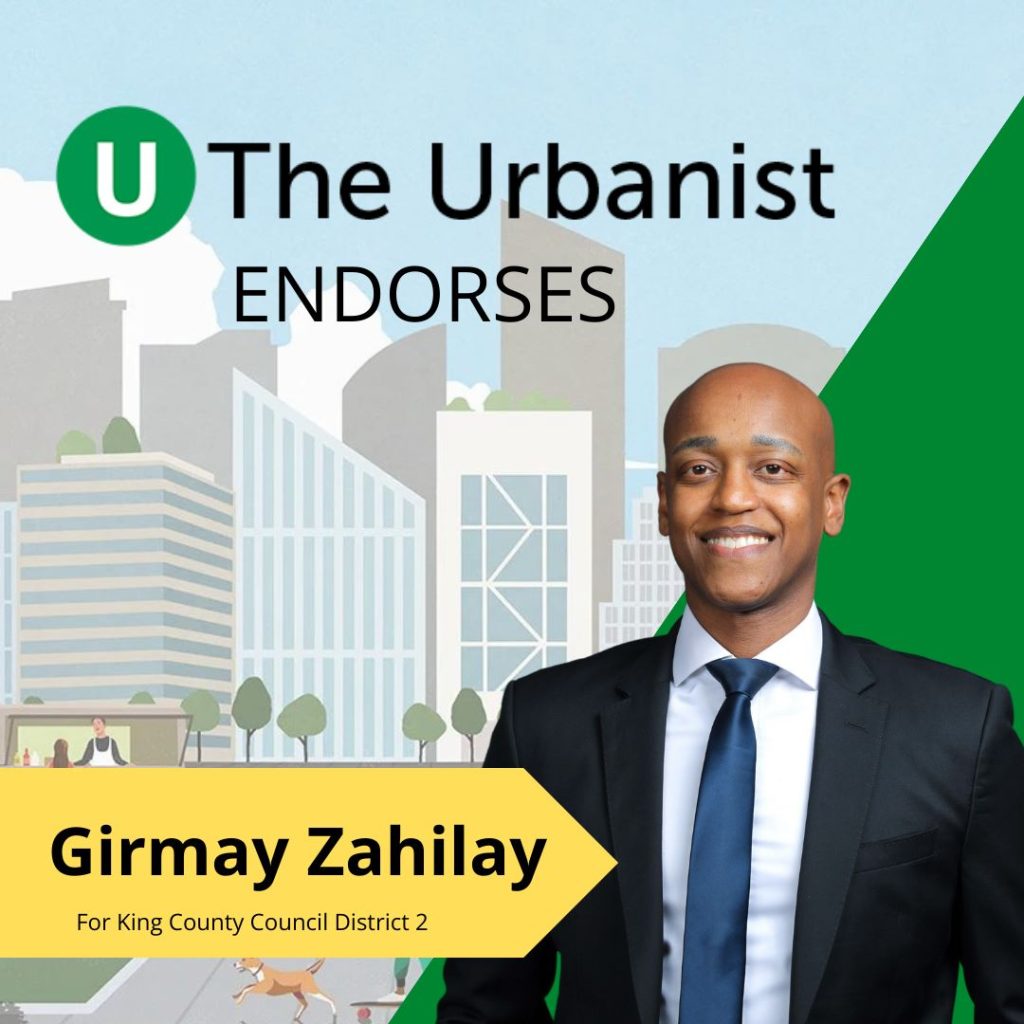
We endorsed Zahilay four years ago in his upstart campaign against long-time incumbent (and local civil rights legend) Larry Gossett. Four years later, Zahilay has proven himself to be a vocal and effective advocate for parts of our county long-neglected by local government. His office pivoted quickly in response to the pandemic to provide or organize direct support to the local community, and he has since continued to be a leader in public health efforts through its support of the Health through Housing initiative, in the siting of crisis care centers, and in recent and ongoing efforts to reduce gun violence across the county.
We continue to encourage Zahilay to look for new sources of funding for transportation projects that will benefit his district — he continues to be more skeptical of transportation benefit districts than we think is warranted — but have in general been grateful to have such a strong public health and housing leader in office for the last four years. Zahilay has redefined the office of county councilmember in a way that has improved governance across the county in a meaningful way. He more than deserves reelection.
Vote Zahilay.
Questionnaire:
King County Council, District 4 – Jorge Barón
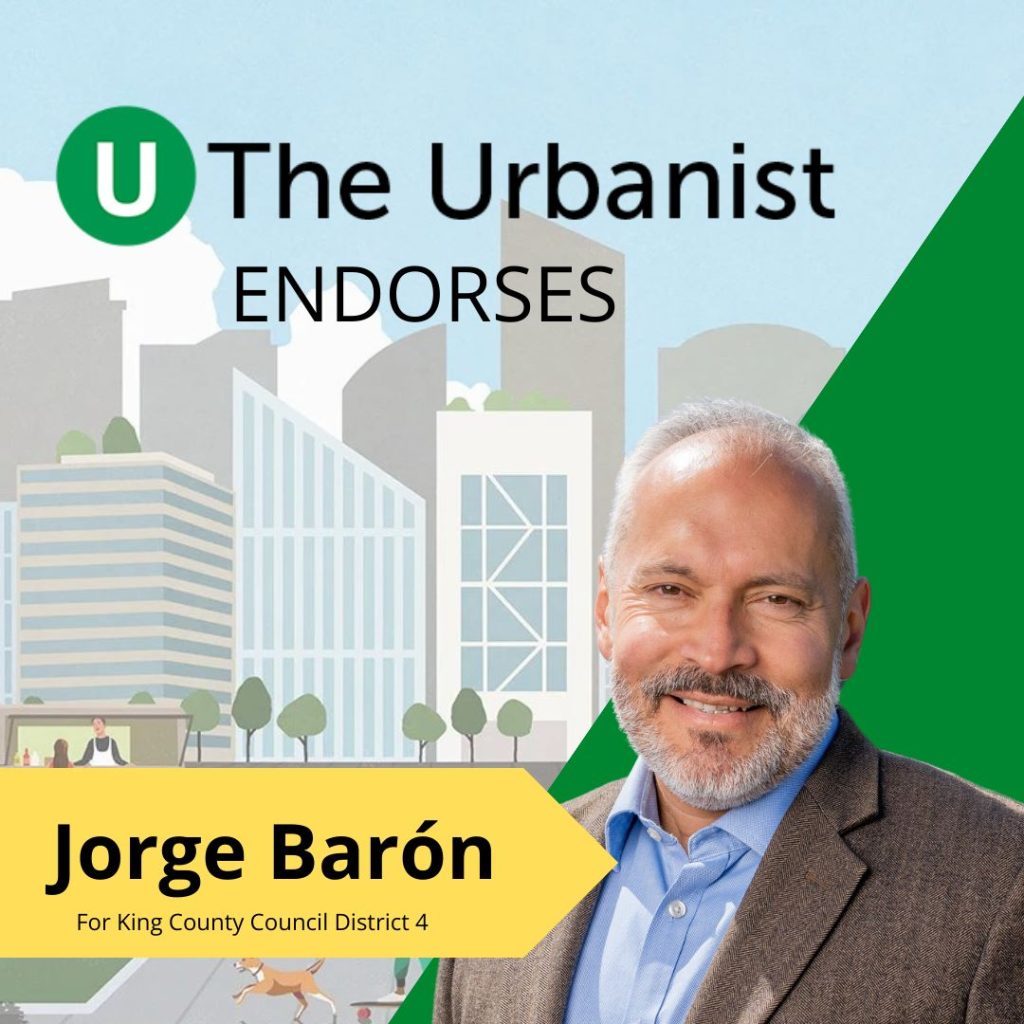
This year’s slate of King County Council D4 candidates was the race that made us most wish for Ranked Choice Voting. All three candidates — Becka Johnson Poppe, Jorge Barón, and Sarah Reyneveld – are thoughtful community advocates with superb policy chops. Each of them indicated through their questionnaires and interview answers that they would be excellent King County Councilmembers in different ways. All pledged to improve transit service for riders. We are lucky to have such great candidates in the race.
While we initially endorsed Johnson Poppe in the primary, we found last-minute entrant Jorge Barón to be very impressive and we are excited about all of the different ways he is focusing on progressive revenue, as well as the holistic understanding of county services that he brings as an advocate for immigrant communities. He has the makings of an excellent county councilmember, just as he’s been a visionary and tireless fighter as leader of the Northwest Immigrant Rights Project.
When looking at the transportation crisis facing Sound Transit and King County and how to address it, he sees an approach that doesn’t end at bringing it up to the standards of frequency, reliability, and safety that we expect. He sees the need for more progressive funding mechanisms to fund those transit upgrades. Báron will be a bold visionary and a critical implementer of an Urbanist vision. Vote Báron.
Questionnaires:
King County Council, District 6 – Claudia Balducci
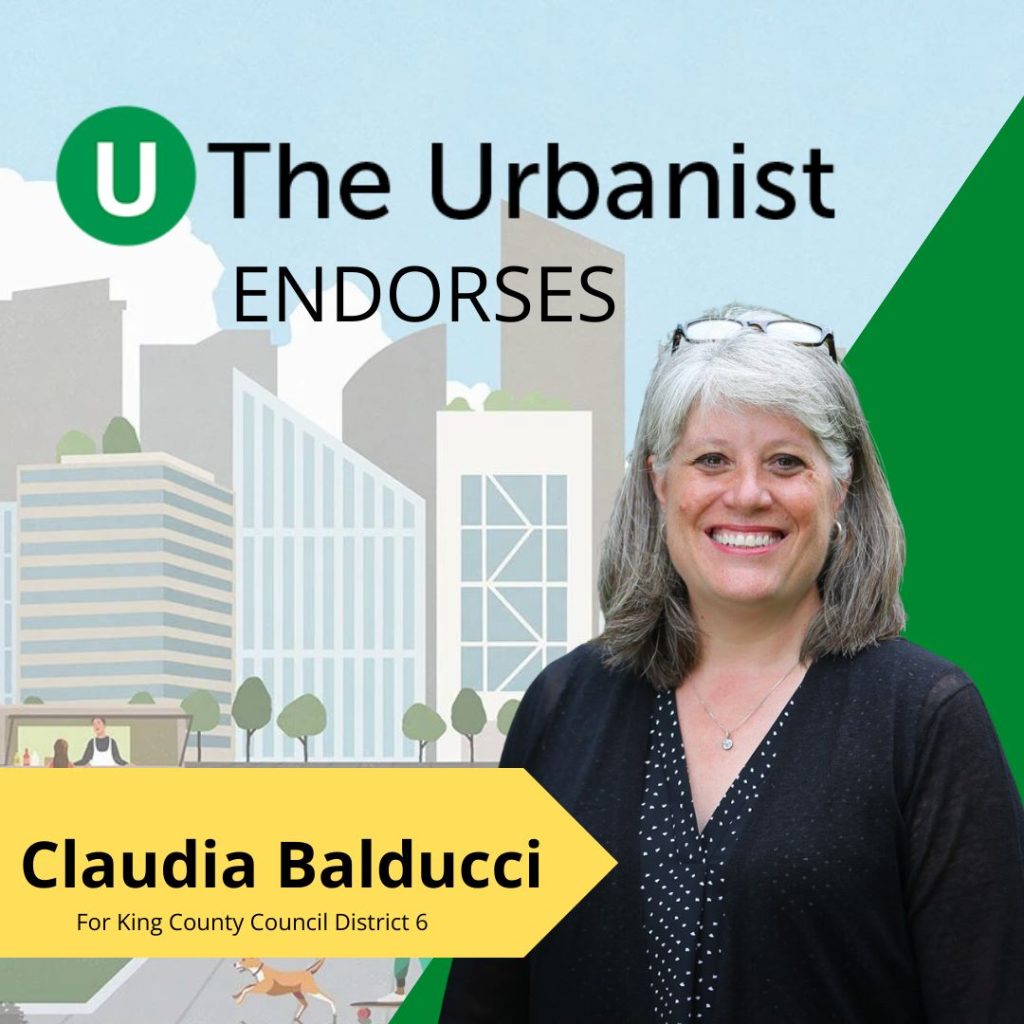
If you’re an urbanist living in King County Council District 6, which includes most parts of Kirkland, Bellevue, Redmond, as well as Mercer Island, you don’t have a hard choice ahead of you this year as it pertains to the County Council. Claudia Balducci, who has been representing District 6 since 2016, remains one of the most effective and consistent voices across the entire region when it comes to public transit access, climate change, affordable housing, and pedestrian and bike safety.
From her position on Sound Transit’s board and as chair of the agency’s System Expansion committee, Balducci has been an outspoken advocate of transit riders in every corner of the region, from pushing to open the East Link Starter Line to helping ensure that a Chinatown-International District station that directly connects with existing transit hubs in the area moves forward as part of environmental analysis for Ballard Link.
As president of the Puget Sound Regional Council, Balducci fought to ensure that the regional transportation plan, focused on 2050, is actually in line with the state’s near-term climate goals and to ensure that traffic safety was a central element of the plan.
As chair of the King County Regional Housing Committee, Balducci has worked tirelessly to ensure that the body creates real and lasting accountability structures for investments in badly needed affordable housing countywide. Balducci is as strong an ally that urbanists across Puget Sound have in elected office, and the region would be much worse off without her leadership. Vote Balducci.
Questionnaire:
King County Council, District 8 – Teresa Mosqueda

Teresa Mosqueda has proven herself an incredibly effective leader on the Seattle City Council over the last half-decade, and we expect her to take that same set of skills and dogged tenacity to the King County Council this fall, with our full support.
Few councilmembers can boast of accomplishing more than Mosqueda has in her one and a half terms. In the midst of a pandemic-induced budget crisis, she shepherded the JumpStart Seattle program into fruition, which was probably the largest step Seattle has ever taken toward progressive tax reform. JumpStart will fund affordable housing, Seattle’s Green New Deal, and social service investments for generations to come thanks to Mosqueda’s work — all while reducing the regressive nature of our local tax code. It took careful coalition-building work to craft, pass, and defend the program, and Mosqueda knocked it out of the park at every step, ensuring a durable program.
Mosqueda’s distinguished record goes beyond Jumpstart, as she’s also a rock steady vote for zoning reform, housing abundance, worker protections, police accountability, transit improvements, climate action, and increasing traffic safety. She describes transit, housing, child care, and health care as “pillars” of her County Council platform. Given her track record at the City, we’d expect more success on those fronts at the County next year.
Mosqueda would support a countywide transportation benefit district (TBD) in order to get King County Metro back on the path to growth and reliable service. Sadly such a countywide TBD doesn’t currently have the votes on council, but we are optimistic that the incoming crop of leaders, who are more proactive about transit, would put it over the top.
Meanwhile, the main opposition in the race, Burien Mayor Sofia Aragon, is fresh off of taking a performative stand against her homeless neighbors that ended up costing Burien a million dollars in County funding and wiping out most of the Burien planning commission in the process. Any hope of Aragon being a reasonable progressive option has disappeared.
Mosqueda is a rising star in local politics, and she has a proven record of delivering big wins for the working class. Voters would be wise to send her to County Council, where we expect her to continue to grapple with big challenges around housing, transit, child care, and health care and deftly deliver more big wins. Vote Mosqueda.
Questionnaires in King County D8:
- Teresa Mosqueda
- Sofia Aragon did not respond.
Port of Seattle Seat 2 – Sam Cho

Running unopposed, current Port of Seattle Commission President Sam Cho has proven himself worthy of another term. He has taken the lead on combating human trafficking at the Port, which started with a public awareness campaign in 2019, and then in 2020 the Port instituted a requirement that 100% of employees be trained on best practices to prevent trafficking. This year, Cho carried that work nationwide after being appointed to the USDOT Advisory Committee.
While we have disagreed with Cho over the past few years, most notably on the issue of widening SeaTac’s arrivals drive to accommodate more private vehicles when transit mode share at the state’s largest airport is abysmal, we have been encouraged by some shifts Cho has made. When running for office four years ago, Cho was a full-on opponent of the idea of one day tolling the main airport drive, something his colleagues like Ryan Calkins were open to. These days, Cho told us that he does see a path to implementing congestion pricing at the airport.
With the Port of Seattle one of the biggest institutional barriers to fundamentally rethinking how Seattle as a region approaches transportation and housing, we’d be enthusiastic about supporting a candidate that was thinking more boldly about these issues. Barring none, vote Cho.
Questionnaire:
Port of Seattle Seat 5 – Fred Felleman
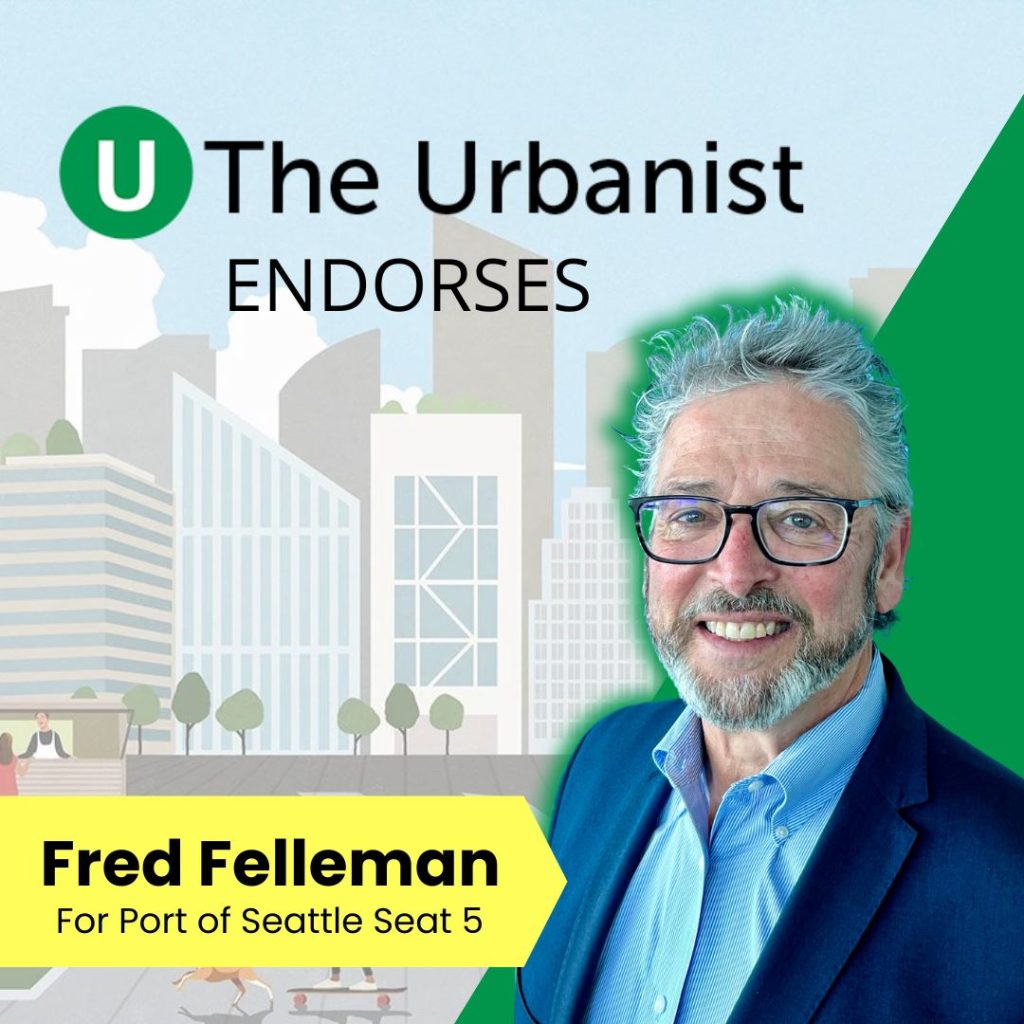
Fred Felleman, running for a third term, faces Jesse Tam, who falls short of the level of a serious challenger for the Port Commission’s most senior member. Filling in the bubble for Fred Felleman is the best choice voters have this August.
The lack of candidates running for this seat is a bit of a shame: the Port faces some serious issues, including systemic problems around oversight of its massive capital projects, many of which predate even Felleman. Executive Director Steve Metruck and his staff largely run the table at the Port, and while we appreciate Felleman’s acknowledgment of the ways that the current commission structure puts the body at a disadvantage — part-time, low-pay positions — we’re not optimistic that reelecting Felleman will put those issues front-and-center.
We’re also happy Felleman is raising issues that are inhibiting growth in passengers at SeaTac taking transit to the airport, though ultimately it’s on the Port to get serious about mode shift, and candidates have been telling us Airport Way tolling or a broader system of congestion pricing is on the horizon for nearly a decade. The Port’s recent hardline positions against any new housing capacity in SoDo illustrate the range of issues that the body has its hands in, but voters won’t have much chance to push that policy this year. Until they do, vote Felleman.
Questionnaires:
The Urbanist Elections Committee consists of Ryan Packer, Maya Ramakrishnan, Christopher Randels, Hannah Sabio-Howell, Jazmine Smith, Doug Trumm, Rian Watt, and Anita Yandle.

Elections Committee
The Urbanist was founded in 2014 to examine and influence urban policies. We believe cities provide unique opportunities for addressing many of the most challenging social, environmental, and economic problems. We serve as a resource for promoting urbanism, increasing political participation, and improving the places we live. The Elections Committee consists of community volunteers and staff members of The Urbanist and is a standing body representing the political values of our organization.

